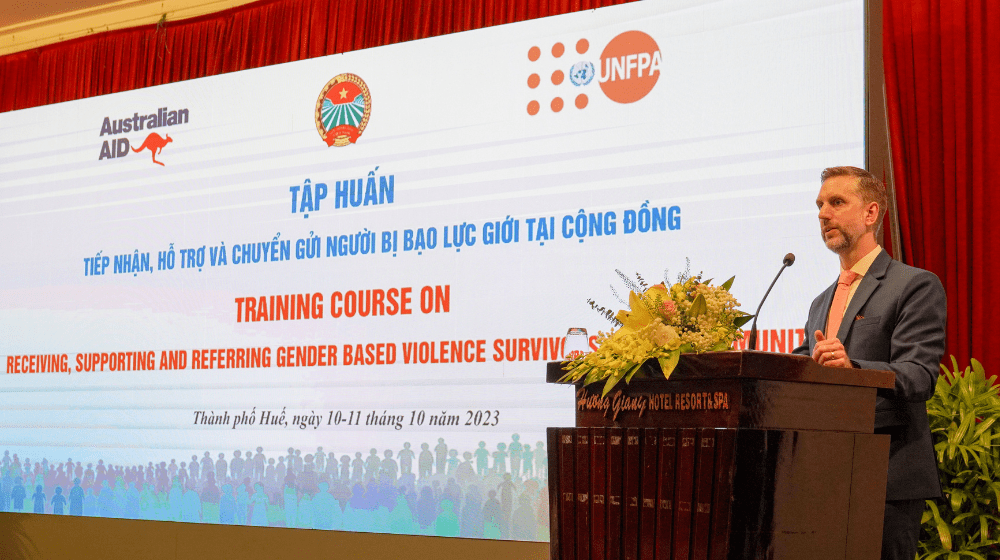- Representatives from the Viet Nam Farmers’ Union;
- Participants from the central provinces of Thanh Hoa, Nghe An, Ha Tinh, Quang Tri, Quang Ngai, Quang Binh, Thua Thien Hue, and Quang Nam;
- UNFPA colleagues from Viet Nam Country Office
I’m very pleased to be invited to your training workshop in the beautiful, historic city of Hue. I hope that this workshop will be useful to all of you because in two days, it will provide you with the latest knowledge and information about gender-based violence as well as the principles and skills to support GBV survivors. In addition, I hope you will take away a better understanding of the GBV referral pathway.
As the UNFPA Representative in Viet Nam for nearly two months now, I have learnt a lot about the positive impacts of UNFPA interventions in reducing and preventing gender-based violence here in Viet Nam. This includes the One Stop Service Centre, the Anh Duong House (Ngôi nhà Ánh Dương) and the GBV hotline run by the Viet Nam Farmers’ Union.
I fully recognise that such impacts could not be achieved without your wholehearted commitment. From talking to call-handlers at the VFU recently, I know that over the past 2 years, you have collectively handled around 20,000 calls, many of which were serious GBV cases, happening in the evening or late at night. You also provided counselling support and referrals to 2,200 GBV survivors.
Dear participants,
The UNFPA-supported National Study on Violence against Women in Vietnam in 2019 showed that nearly 2 in 3 women (62.9%) experienced at least one form of physical, sexual or psychological violence or controlling finances or behaviours by their partner during their lifetime. The study also found that the prevalence of physical violence against women is higher in rural areas at 28% compared to urban areas at 22%. More shockingly, half of women who experienced physical or sexual violence by a husband kept silent, and over 90% of those experiencing violence did not seek any help at all.
To help change these statistics, and more importantly the lived experience of women and girls, a toll-free hotline, set to international standards, was officially activated by the Vietnam Farmers’ Union in December 2021. This hotline provides 24/7 care and support, as well as referral services to women and girls who are experiencing or are at risk of domestic violence. It also provides text-based support so that women and girls can seek help at any time in a discreet manner, without being noticed by perpetrators.
UNFPA Viet Nam is honoured to support the introduction of this toll-free hotline under the project to mitigate COVID 19 impacts on Vulnerable Populations funded by the Government of Japan.
In efforts to help maintain the Viet Nam Farmers’ Union hotline, UNFPA supported the Project “Prevention and Response to gender-based violence and other harmful practices” for the period 2022 to 2027 aspart of UNFPA’s 10th Country Programme in Viet Nam.
I’m also very pleased to hear that over the past 2 years, UNFPA has supported the expansion of the hotline, especially in rural and mountainous areas via diversified communication activities. The Hotline and its services have been advertised on prime time, national TV - VTV1, thousands of posters and banners displayed in various communities in 12 provinces, and news articles published in Today’s Rural Lives, a newspaper of the Viet Nam Farmers’ Union.
As a result, more and more rural women and girls dialled the Hotline, often GBV survivors who sought immediate interventions and assistance from the helpline handlers. This training workshop is specifically designed to ensure you are well-equipped to help in emergencies and to follow referral protocols, as well as to provide you with skills in receiving, supporting, and referring GBV survivors in the community.
Dear friends,
Two weeks ago, at my meeting with the Vice Chairman of Viet Nam Farmer’s Union, I reaffirmed UNFPA’s support to the Government of Viet Nam, including the Viet Nam Farmer’s Union to end gender-based violence.
UNFPA believes that all women and girls in Viet Nam, including those most vulnerable or marginalised, have the right to a life free of violence and that everyone is part of this country’s sustainable development process to leave no one behind.
Xin cám ơn!


